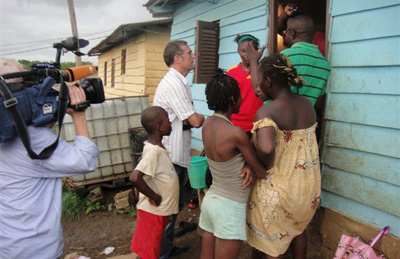New York, June 17, 2011–The Committee to Protect Journalists condemns the detention of a German television crew and the destruction of their footage by authorities in Equatorial Guinea.
On Saturday, plainclothes state security agents led by Teobaldo Nchaso Matomba, the director of the state-controlled broadcaster TVGE, arrested reporter Jorg Brase, cameraman Michael Berger, camera assistant Stanley Oriaro, and their fixer (identified only as “Robert”) while they were filming a concert at the French cultural center in Malabo, ZDF producer Christine Otieno told CPJ. The ZDF crew was taken to TVGE’s studios, where security agents and Matomba ordered them to hand over all their video footage, the broadcaster said in a statement.
The three journalists and their fixer were held for five hours while Matomba ordered two men who claimed to work for a Spanish production company called Elipse to delete any footage deemed to show in the country in a bad light, including an interview with an opposition leader and pictures of children playing in slums, according to Otieno. The journalists were escorted to the airport a few hours later. Authorities then confiscated memory cards containing footage of the interview with a human rights lawyer. Their local fixer subsequently reported being briefly detained and threatened not to work with foreign journalists, Otieno added.
On June 5, the day the ZDF crew arrived in Equatorial Guinea, President Teodoro Obiang said in a speech marking his 69th birthday that there are no violations of human rights in his country.
“The actions of the state security agents against the ZDF crew undermine the president’s assertion that Equatorial Guinea is a country without human rights problems,” said CPJ Africa Advocacy Coordinator Mohamed Keita. “This is merely the latest heavy-handed attempt to censor what the world is able to see of the country. We call on the authorities to return ZDF’s footage immediately.”
Equato Guinean officials in Malabo and in Washington did not immediately respond to CPJ’s repeated attempts to reach them by phone and email for comment.
The crew arrived in Equatorial Guinea to film stories about women’s soccer and the general state of affairs of the country, according to the ZDF statement. They said they were working with official accreditation but under tight government surveillance.
Equatorial Guinea is one of the world’s 10 most censored countries, a 2006 CPJ study found.
